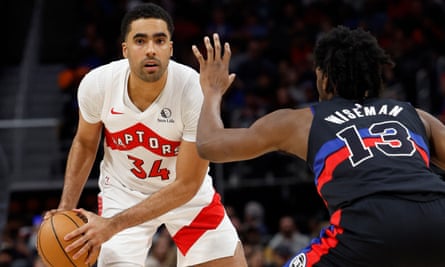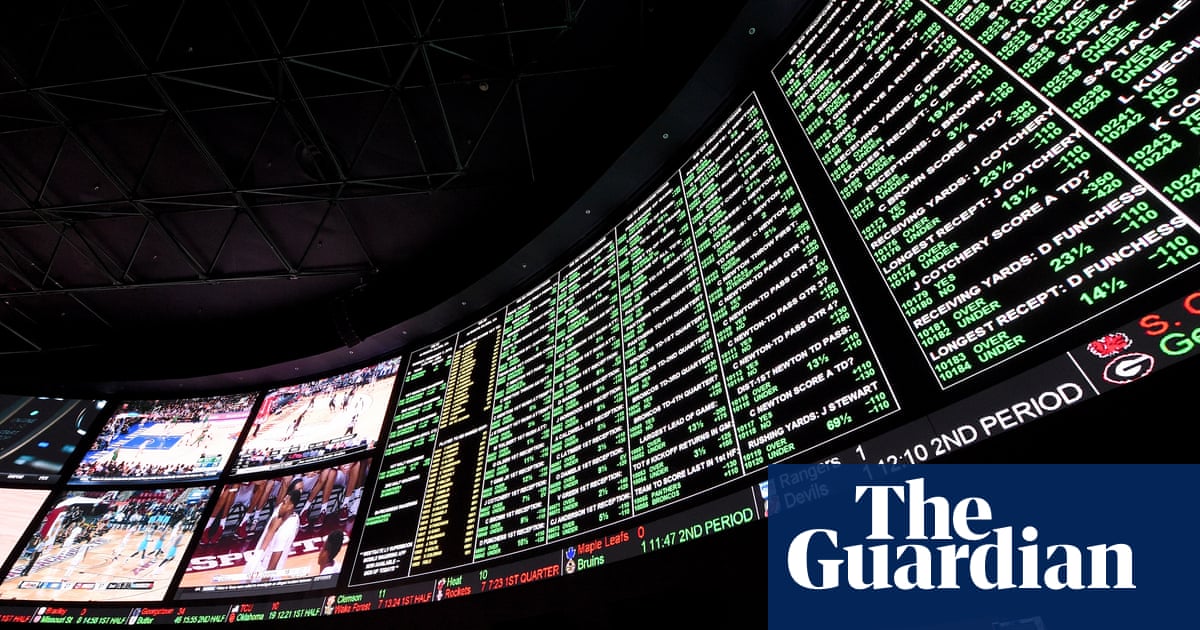
‘It’s an addiction’: NBA’s ties to gambling trouble players past and present
The league has forged close links to betting. But many worry about how such relationships will affect athletes and fans
In life, there is one constant – change. For professional sports, the biggest change of late has to do with gambling. Most US states now offer fans the chance to bet on games and player props legally. And big professional sports leagues like the NBA have embraced that recent change in legislation, too. What was once a third-rail topic is now a major source of income, with ESPN’s financial guru Bobby Marks saying this year the NBA is “projected to receive $167m in revenue from casinos and betting, an 11% increase from last season.”
One need look no further than ESPN to see how integrated sports betting is with major leagues and the media outlets that cover them. Right at the top of the company’s website is a new tab, ESPNBET, the broadcaster’s very own sportsbook, which launched in November of 2023. Is this a conflict of interest? Maybe, maybe not. But gambling seems to drive a great deal of new business in sports. For NBA fans frustrated by the in-game reviews, the challenges and lengthy replays, they have gambling largely to blame, especially in the wake of the league’s referee scandal earlier this century. For a business that lost a great deal of money during the pandemic and one that is trying to grow globally, gambling promises an influx of cash, and the NBA has two official betting partners. The league says it promotes responsible gambling, but there are thought to be around three million problem gamblers in the US, and the National Council on Problem Gambling says the risk of gambling addiction in the general population increased by 30% between 2018 and 2021. Betting ads appearing everywhere on NBA broadcasts almost certainly won’t help those numbers.
In his memoir, It’s Hard for Me to Live with Me, former NBA star turned Twitter celebrity Rex Chapman details his addiction to betting on horse races. He lost more money than he could count on gambling after retirement and, along with opioid abuse, it nearly cost him his family. Yet, Chapman’s story is common among athletes and non-athletes alike. So why has the NBA aligned itself with gambling? Whatever the reasons, it has done so to such a degree that during a recent game between the Golden State Warriors and San Antonio Spurs on Easter Sunday, there were ads on the court promoting the gambling company, Bet365. As Steph Curry dribbled the ball up and as Victor Wembanyama dunked, there was the Bet365 logo below the scorer’s table. Not to mention, just months ago, Mark Cuban sold a majority stake in his Dallas Mavericks to big-time casino owners with an eye on bringing gambling to Texas.
Aside from the threat of addiction, some within the league are worried that the close partnership between the NBA and sportsbooks is dangerous. Cleveland Cavaliers coach JB Bickerstaff said he’s been threatened by gamblers. “They got my telephone number and were sending me crazy messages about where I live and my kids and all that stuff,” Bickerstaff said after a recent game against the Miami Heat. “So, it is a dangerous game and a fine line that we’re walking for sure.” Bickerstaff isn’t alone. Indiana Pacers All-Star guard Tyrese Haliburton said he’s been seeking professional help for his mental health, adding: “To half the world, I’m just helping them make money on DraftKings or whatever. I’m a prop.”
This is a marked difference from earlier in NBA history, before legal gambling became widespread and the league aligned itself so closely to betting. When asked if he was ever accosted by a disgruntled bettor, All-Star guard Kenny Anderson, who retired in 2005, told the Guardian, “Nah, sports betting wasn’t really big back then as it is now. They got angry [if they lost] but they didn’t really point it at me.” And All-Star Michael Ray Richardson, who was active in the 1980s, added, “Never. Back then it wasn’t a whole lot of betting like it is now.”
But perhaps the biggest issue of late comes with the league investigating bench player Jontay Porter, brother of Denver Nuggets star Michael Porter Jr, for “betting irregularities”. (Why there were sports props on bench players on losing teams is another question altogether.) Since then, Porter’s big brother has come to his defense, saying, “I highly doubt he would do anything to put [his NBA career] in jeopardy”, while NBA commissioner Adam Silver said Jontay Porter could be banned from the league for life if found guilty.
Whether or not the league will find any wrongdoing with Porter and the Raptors, the question remains: why does the league create risk by getting into bed with gambling companies? That’s something that has occurred to many veterans of the league.
“Why allow it,” wonders Lionel Hollins, a former All-Star guard and NBA champion who later coached for years in the league. Speaking to the Guardian, Hollins says, “[It’s just] another issue that has to be monitored and for players and coaches to have to deal with.”

After all, the NBA and its players already have so much on their plates. Sure, they get paid a lot, but they already have to deal with angry fans complaining over wins, losses and fantasy leagues, not to mention media responsibilities. Why add another variable and one of such financial consequence to the equation? “[Some have] projected that by the year 2030, sports in general will generate over $800bn,” former Los Angeles Laker and NBA champion, Jim Chones, tells the Guardian. “This was before betting and gambling. So, we may be there already. That’s why coaches don’t last. [Owners] get rid of them during the season because the money is too big. The money is so big that coaches become expendable, cheap players become expendable.”
Far from a cheap player, there was a time when some speculated whether or not NBA legend Michael Jordan’s 18-month hiatus from the NBA during the mid-1990s wasn’t merely a desire to play minor league baseball, but rather a secret suspension by then-commissioner David Stern due to Jordan’s big time gambling impulses. But while that theory has since been debunked, the fact that it was considered shows how far the league and casinos were from one another back then. Now, they’re bosom buddies. The 11-year veteran Terry Tyler calls this “hypocritical.” He says, “Remember when everybody thought Michael Jordan was gambling and people lost their mind, and he wasn’t betting on anything [NBA-related] … Now all of a sudden it seems as if it’s OK. I think it’s pretty hypocritical … It’s sending out a bad message.”
To Tyler, along with many others, this closeness is especially dumbfounding, especially given the possible consequences and addictive qualities of gambling. “Personally, I do not gamble,” the former Boston Celtic and four-time NBA champion Robert Parish tells the Guardian. “Gambling is a problem when you are not in control, it’s an addiction.”
Of course, the NBA, even with its closeness to gambling, does not permit its players to bet on NBA games (hence the investigation into Porter), though they can wager on other sports. But one might wonder, isn’t the league courting these types of indiscretions by cozying up to gambling so closely? “As for the gambling in a sport you participate in,” says Parish, “that’s a no-fly zone. Because you may have information that could influence the outcome of games. I have been approached by people asking my opinion on whether we will cover the point spread [on a given night]. I do not know if they were fans or bookies. My response was: we the players play the games to find out winners and losers.”
Parish played in the NBA for 20 years, from 1976-77 through 1996-97, way before sports betting became mainstream in the NBA and other leagues. Now, though, one can imagine the types of people who may approach the league’s stars today, adding pressure and perhaps even illegal incentives at the drop of a dime. Nevertheless, it doesn’t look like gambling and sportsbooks are going anywhere anytime soon. Turn on any popular NBA podcast, for example, and you’ll likely hear ads for DraftKings or FanDuel. Turn on an NBA game and you’ll see Bet365. It’s a roll of the dice for the NBA and other leagues to get so close to casinos and their customers. It could end up being a risk the NBA and other US leagues end up trying to pull back from. The English Premier League, which forged ties with gambling long before the NBA, last year decided to ban betting sponsors on shirts from 2026 onwards. If addiction and scandals rise around the NBA, the league may be forced into similar decisions.
